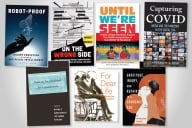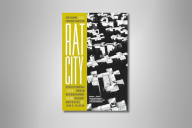You have /5 articles left.
Sign up for a free account or log in.
Much of my online book-browsing is a quest for the understandably but undeservedly neglected: the search for titles on little-known authors, unsuccessful political movements, and forms of music that many people flee. With a narrow niche, you soon get to know what’s available. But there are occasional surprises. Over the past year, though, my search results have shown wave after wave of new books on topics of very limited appeal. It began to feel as if someone were custom-editing them just for me.
But all of them were outrageously expensive -- paperbacks of fewer than 100 pages that sold for $50, while anything bigger than a pamphlet tended to cost nearly twice that. Often, no author was listed, and I never recognized the publishers. And then a few reviews by people who had purchased them began to appear, complaining that the were print-on-demand books consisting entirely of material from Wikipedia.
Caveat lector. At some point, the Amazon listings began to identify the source of the content. Even so, the whole thing seems shady. It's as if the books were being created in order to take advantage of any researcher desperate enough (or librarian overworked enough) to order a book strictly on the grounds that nothing else on the subject is available.This seems to me to be drawing the line between scholarly publishing and con artistry much too thin.
Not that a book consisting entirely of reprints from Wikipedia is, by definition, worthless. A lot has changed since five years ago, when Stephen Colbert could create the "fact" that Africa's elephant population had tripled in the last three months. The entries remain susceptible to vandalism, or to invasion by the chronically misinformed, but a substantial community of regular contributors and editors has developed that exercises a degree of control, and numerous studies show that its level of reliability compares favorably with other reference works.
Meanwhile, an interesting dialectic of popularity and authority is at work as major institutions begin to find it necessary to deal with the site, which recently celebrated its 10th anniversary. In May, the first Wikipedian in Residence began assuming his responsibilities at the National Archives. Around the same time, the Association for Psychological Science announced its Wikipedia Initiative, encouraging members “to participate by adding new entries and enhancing existing ones with more complete and accurate information with references.”
A few years back, universities were debating whether to ban citation of Wikipedia in student papers. The APS, by contrast, makes an appeal to “teachers and students who can make updating or creating Wikipedia entries part of coursework” as a practicum in learning “the importance of logic, strength of argument, flow and clarity of writing, and citations of the appropriate literature.” Wikipedia has undertaken a number of other initiatives to academe, as reported last month in Inside Higher Ed. And according to a paper published earlier this week, the online reference is being both analyzed and cited with some frequency in the peer-reviewed literature of several disciplines.
"The Visibility of Wikipedia in Scholarly Publications" by Taemin Kim Park appeared on August 1 at First Monday, a peer-reviewed online journal of research on the internet. Park notes that more than 50 theses or dissertations on Wikipedia have been written around the world, along with 200 monographs.
Park writes that “authors affiliated with [research] institutions in the U.S. appear to cite Wikipedia more often in their scholarly publications than authors in any other country," with scholars “affiliated with Carnegie Mellon University, Georgia Institute of Technology, and Indiana University [being] most active in citing Wikipedia.” (Universities in China run a fairly close second.) These citations appear in papers that may not be focused on Wikipedia itself.
The author of the paper is an associate librarian and adjunct in information science at Indiana University at Bloomington. Gathering information from the Institute of Scientific Information’s Web of Science database (covering 10,000 journals in the humanities as well as the natural and social sciences) and Elsevier’s Scopus (incorporating 18,000 journals and book series, plus 3.6 million conference papers), she found 1,746 works containing research on Wikipedia that appeared between 2002 and 2010.
Researchers in computer science accounted for the largest share of the work on Wikipedia (42 percent in WoS, 72 percent in Scopus) with information/library science following (26 percent in WoS). “The fields of mathematics, social sciences, and engineering are also highly productive,” writes Park. “In Scopus, an exceedingly small portion of publications, about 1 percent of Wikipedia research output derives from the arts and humanities.”
Some of the findings are in keeping with fairly well-established trends in many fields of research. A small number of authors and journals produce a disproportionately large share of the publications, for example. And multiple authorship of papers is the norm: “For example, one publication about Wikipedia research in Scopus was coauthored by 37 individuals.”
The U.S. proves to be “far stronger in producing research on Wikipedia than any other country, accounting for about 22 percent of the publications in Scopus and about 37 percent in WoS.” The U.K., Germany, and China follow, by fairly large margins, with other European and Asian countries producing under 5 percent each. The citation of Wikipedia in scholarly articles (whether or not the topic is Wikipedia) tracks fairly closely, with U.S. authors producing 27 percent of the citations in Scopus and 43 percent in WoS.
Anglophone preeminence will almost certainly change as Wikipedia continues to diversify. At present, there are Wikipedias in 282 languages, and last year Microsoft launched the beta version of WikiBhasha, a tool “enabl[ing] contributors to Wikipedia to find content from other Wikipedia articles, translate the content into other languages, and then either compose new articles or enhance existing articles in multilingual Wikipedias.” At present, WikiBhasha works with more than 30 languages, with an initial emphasis being on making English-language entries available “in Arabic, German, Hindi, Japanese, Portuguese and Spanish.”
It’s like something Jorge Luis Borges might have imagined: the Encyclopedia of Babel. Or H.G. Wells's dream of a comprehensive reference work he called the World Brain.
In any case, we seem to be getting used to the idea. An element of moral panic used to emerge in discussions about Wikipedia; this has faded. It’s a tool that has to be used with caution. But that is all too true of reference books of the old sort as well. And I doubt the Encyclopedia Britannica is ever going to have an entry explaining the difference between goregrind, deathcore, and technical death metal.
And anyone who finds a set of Wikipedia entries to be authoritative enough to deserve preserving them between covers can do so without spending a fortune. Ignore the dubious volumes sold by online retailers and make your own instead. Wikipedia has its own book-publishing service called Pedia Press. It already has an extensive catalog. But readers can also edit their own customized volumes of entries that will then be printed on demand, at a reasonable price. Instructions on how to do so are available on YouTube.








